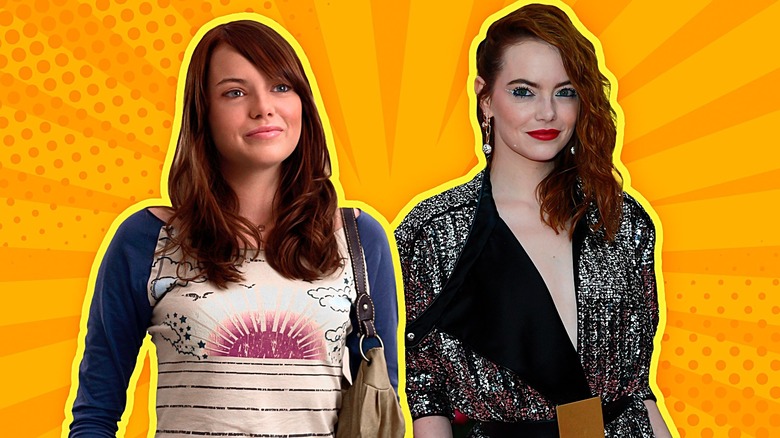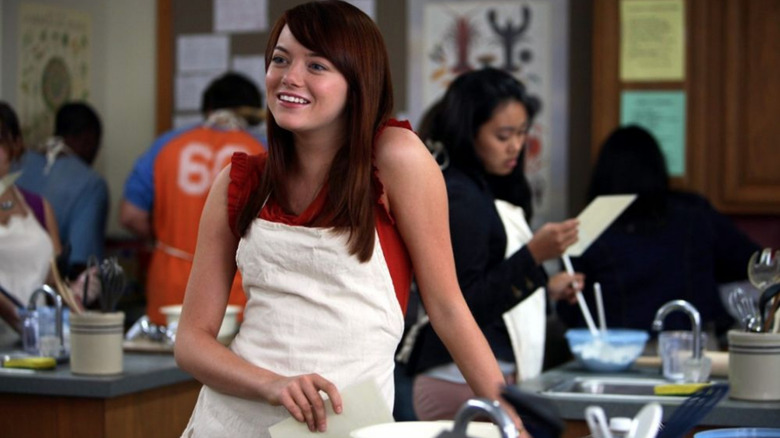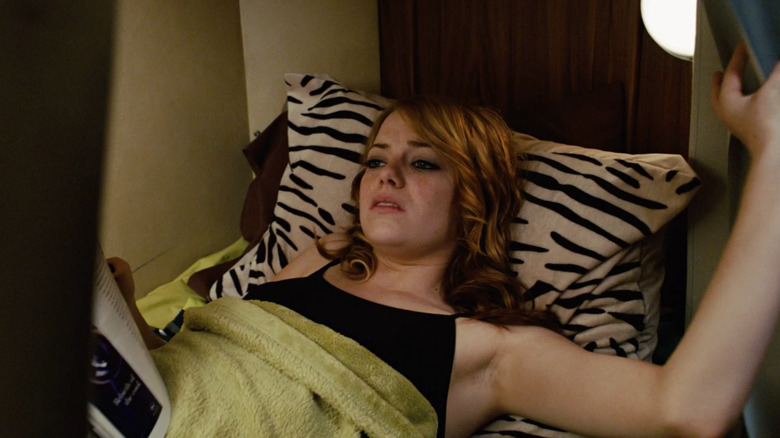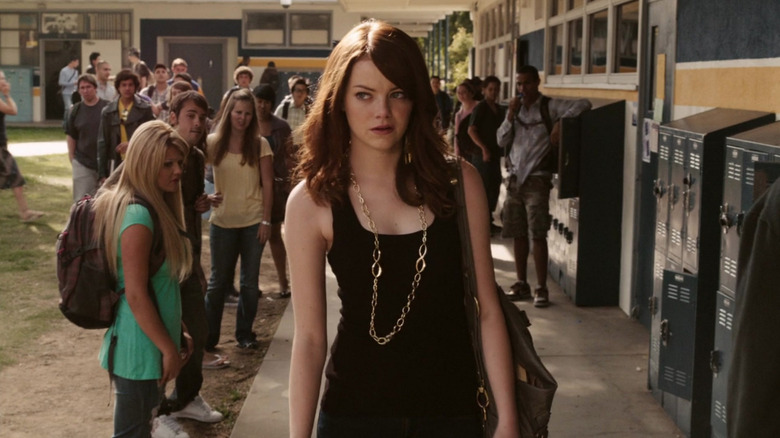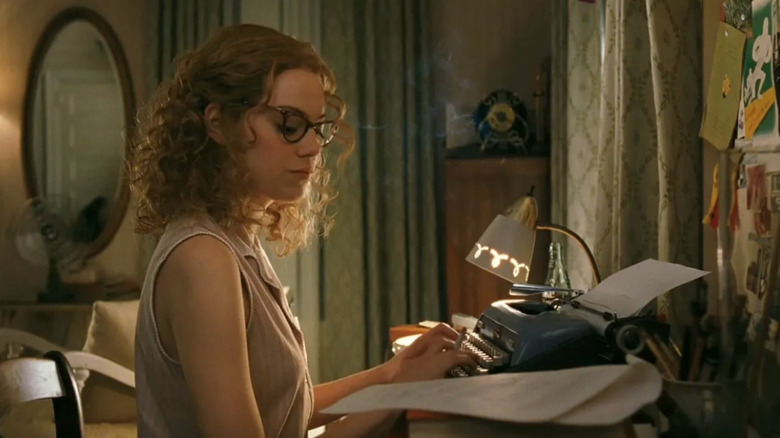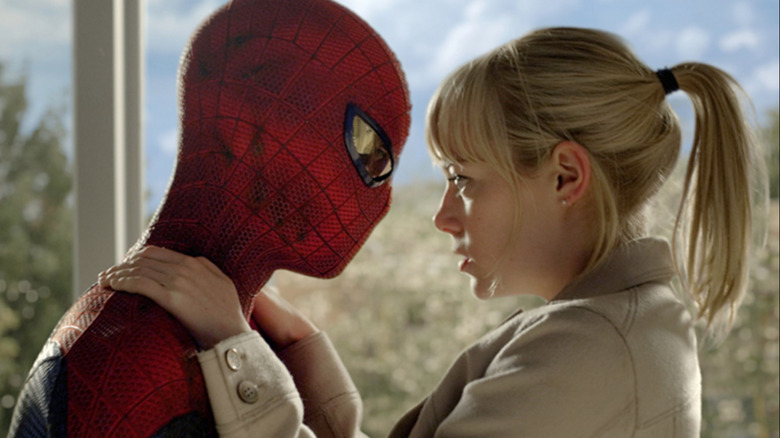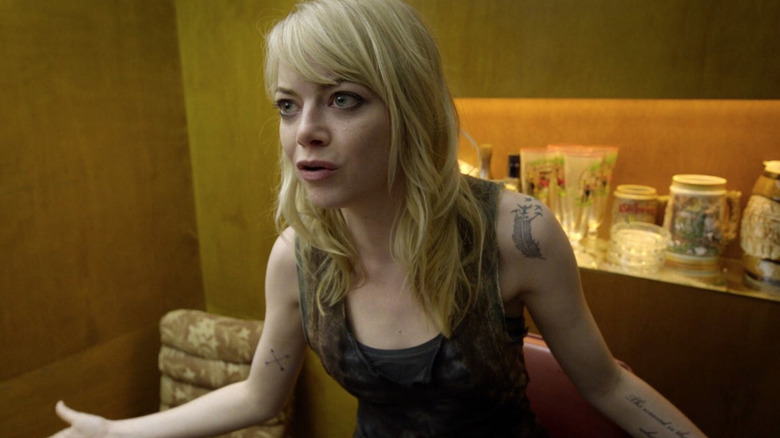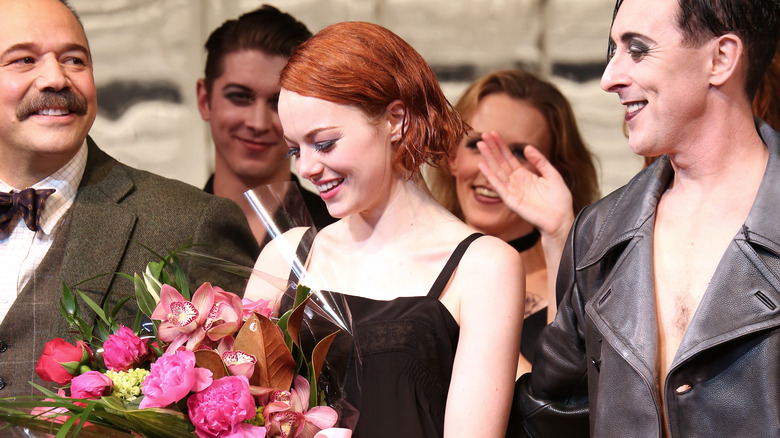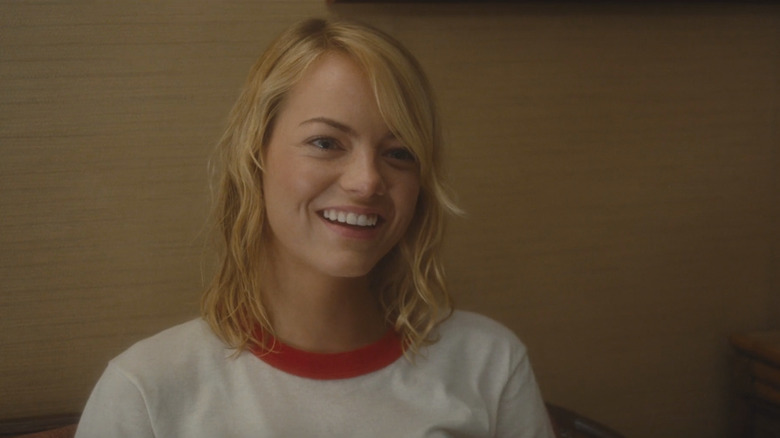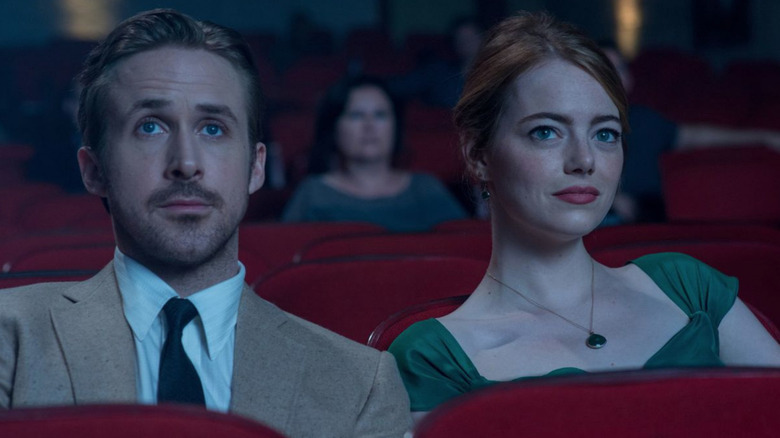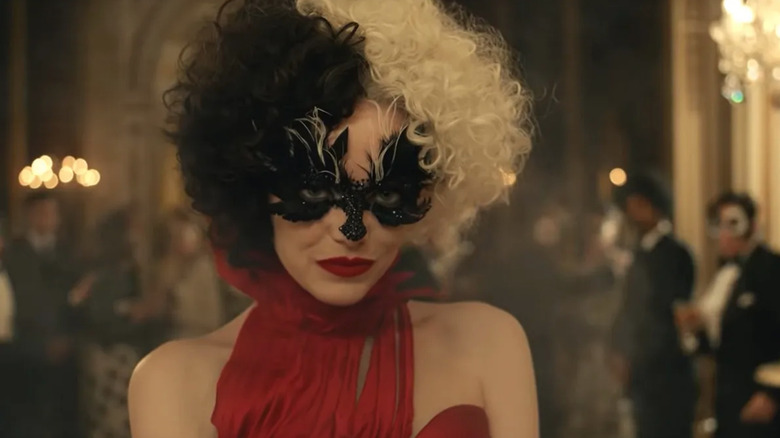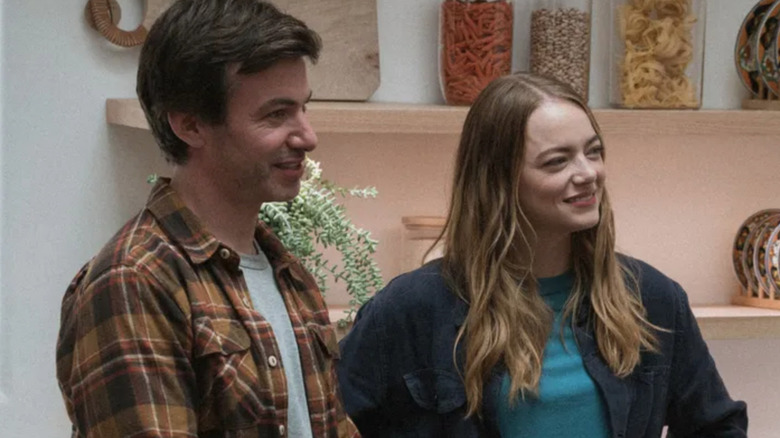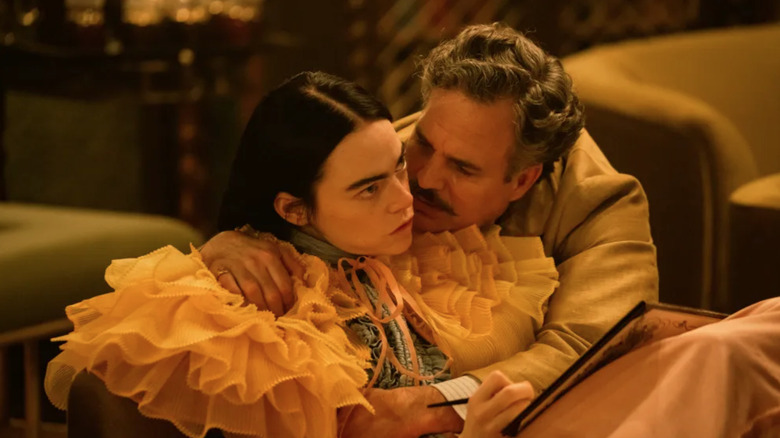Emma Stone's Transformation From Superbad To Today
Evolving from comedy's hottest redhead to an Academy Award winner, Emma Stone has firmly established her presence within the entertainment industry as one of the most influential actors of her generation. Since her memorable breakthrough in the 2007 teen comedy "Superbad," she has ventured into various genres and amassed an impressive collection of awards and nominations over the years. Recognized for her impeccable comedic timing, stellar singing voice, and exceptional versatility, Stone seamlessly immerses herself in each role she undertakes. Whether portraying a high-achieving student in "The Amazing Spider-Man" or a recovering addict in "Birdman," she consistently captivates audiences with her compelling performances.
Like any seasoned career, Stone's acting journey has witnessed both highs and lows, yet she persists in her pursuit of artistic excellence and the continuous refinement of her craft. This comprehensive exploration traces Emma Stone's transformation from her beginnings in "Superbad" to her current status as a celebrated and accomplished actor.
Making her feature debut in Superbad
Having honed her acting skills in local theater during her formative years, Emma Stone successfully persuaded her parents to relocate to California, marking the beginning of her dedicated pursuit of an acting career. Following numerous auditions and TV guest appearances, she finally got her big break with her feature film debut in "Superbad," where she portrayed Jules, the object of Jonah Hill's character's affection. Despite having limited screen time as a supporting character, Stone captivated audiences in every scene in which she appeared. Her performance earned her a Young Hollywood Award, establishing her as a rising star to watch in the entertainment industry.
Her attention-catching performance in "Superbad" not only served as a pivotal moment in her career but also brought about a personal transformation. Previously a natural blonde, Stone embraced a vibrant red hair color, a change suggested by producer Judd Apatow. This seemingly simple alteration became one of her defining trademarks, setting her apart in Hollywood and remaining one of her most recognizable features despite her continuing experimentation with different looks.
A string of disappointments
After her success in "Superbad," offers started pouring in for Emma Stone. The following year, she took on roles in the comedy "The Rocker," portraying the bass player Amelia, and the comedy "The House Bunny," embodying the nerdy sorority girl Natalie. Although the latter achieved greater commercial success than the former, both films were deemed critical failures. Undeterred by the unfavorable reviews, Stone continued to carve a niche for herself in the realm of comedy.
In 2009, she expanded her repertoire with roles in the romantic comedy "Ghosts of Girlfriends Past," the dramedy "Paper Man," and the zombie comedy "Zombieland," alongside Woody Harrelson, Jesse Eisenberg, Abigail Breslin, and Bill Murray. The latter proved to be a significant turning point, emerging as her most substantial success since "Superbad" and breaking the pattern of previous disappointments. The film achieved cult classic status, prompting Stone to reprise her role in the sequel, "Zombieland: Double Tap," a decade later.
Her breakthrough leading role
Emma Stone was back on the rise with her breakthrough leading role in the teen comedy "Easy A" to kick off the new decade. Loosely inspired by Nathaniel Hawthorne's "The Scarlet Letter," Stone plays Olive Penderghast, a high school student who fabricates a web of lies about her rumored promiscuity. Stone's early dedication to the role caught the attention of director Will Gluck, who told The Hollywood Reporter, "We met a lot of people for the part — people who are big stars now — but I knew right away she was the one."
The movie was a box office hit, earning Stone widespread acclaim, with reviews describing her as a "star" and expressing anticipation for her next projects. Additionally, she received nominations for a BAFTA Rising Star Award and a Golden Globe Award for best actress in a musical or comedy. Although Stone had now established herself as a leading comedic actor, the threat of being typecasted loomed, making her next career move crucial in shaping its trajectory.
Breaking out of her typecast
After almost exclusively appearing in comedies, Emma Stone stepped out of her comfort zone when she pivoted to a more dramatic role in the 2011 period drama "The Help." Based on Kathryn Stockett's novel of the same name, Stone played Skeeter, an aspiring writer who writes an expose on the mistreatment of Black maids in 1960s America. Director Tate Taylor was immediately convinced of Stone's suitability for the role from the moment he met her, telling Entertainment Weekly (via IndieWire), "Emma was completely awkward and dorky, with her raspy voice ... and she sat down and we got a little intoxicated and had a blast, and I just thought, 'God! God! This is Skeeter.'"
In a conversation with The Wall Street Journal, Stone delved into the groundwork she underwent for her role, sharing insights into her preparation. This included collaborative sessions with a dialect coach to capture her character's southern accent, coupled with a dedicated effort to educate herself on the nuances of the Civil Rights Movement. Reflecting on her education in the Arizona public school system, she admitted in a Time Out interview, "The extent of my knowledge of the civil-rights movement was the story of Rosa Parks and Martin Luther King Jr." Additionally, Stone learned a valuable lesson that would continue to influence her personal and professional life. "When I was younger, all I really wanted was to make my parents laugh ... But now, I understand the power of storytelling beyond just being a childhood ham," she told The Hollywood Reporter.
Becoming Gwen Stacy
Although it was important for Emma Stone to diversify her roles beyond the conventional female love interest, she didn't entirely forsake the archetype, especially when presented with the opportunity to portray Gwen Stacy in the 2012 Spider-Man reboot, "The Amazing Spider-Man." Venturing into comic book territory for the first time in her life, Stone found herself captivated by the prospect of embodying a character as iconic as Spider-Man's first love. Despite the immense pressure of playing such a beloved character, Stone approached the project with the same commitment she would any other. Acknowledging the role's magnitude, she commented to MTV, "You're going to put the same amount of focus into this that you would with anything. It just happens to be an exponentially bigger budget."
Playing Gwen Stacy also marked a personal shift for Stone as it allowed her to revert to her natural blonde hair color after committing to red for so long. Beyond going back to her (hair) roots, what made this experience even more personal was the off-screen romance that blossomed between her and co-star Andrew Garfield. From 2011 to 2015, the two dated but kept their relationship relatively private. When they reunited in 2014 for the sequel, their chemistry was stronger than ever, making for genuine performances that became an enduring highlight of Stone's expansive career.
Her role in Birdman earned her prestige
From one superhero to the next, Emma Stone's role in the 2014 film "Birdman" couldn't have been more different than Marc Webb's "Spider-Man." In this Academy Award-winning dramedy, Stone plays Sam, a recovering drug addict and daughter of a has-been actor seeking artistic redemption. Tackling the role of such a conflicted and volatile character was yet another significant departure for Stone, perhaps more so than when she starred in "The Help."
Witnessing this new side of her acting skills further established Stone's prestige in the industry. Critics and audiences alike were especially impressed by her standout one-take monologue directed at Michael Keaton's character. Stone described the scene to The Wall Street Journal, stating, "I don't think I saw it as comedy or tragedy, so much as just this little truth bomb that she was finally getting the chance to throw at him." For her performance, she received her first Academy Award nomination for best supporting actress among the film's nine total nominations, although Patricia Arquette ultimately beat her out for her role in "Boyhood."
Making her Broadway debut in Cabaret
That same year, Emma Stone made her Broadway debut in the Roundabout Theatre Company revival of the Broadway musical "Cabaret." Stone participated in the show from November 2014 to February 2015 after taking over Michelle Williams' role as Sally Bowles, a British singer and dancer at the Kit Kat Klub in Berlin who aspires for something greater. In addition to tapping back into her community musical theater roots, Stone leveraged her experience on the set of "Birdman" to ease the transition from screen to stage. Reflecting on the challenges of filming "Birdman," she shared with MTV, "It was definitely hard. It was like theater and film and stunts all at once. It had to be perfect every time," emphasizing how this intense experience fueled her desire to take on the demanding nature of performing in a musical eight times a week.
Revealing her inner musical theater enthusiast, Stone fondly recalled her first encounter with "Cabaret" at the age of nine in an interview with Deadline. She described feeling awestruck by Natasha Richardson's performance of the musical number "Maybe This Time." "There was just that kind of authentic feeling that she was having in that song," she explained. Recapturing the same role in 2014, Stone's rendition of the song earned praise from critics, including those from The New York Times and Variety, who commended her for bringing her own authenticity to the iconic performance.
She faced controversy for whitewashing
In 2015, Emma Stone found herself at the center of a scandal for her role in the romantic comedy "Aloha." In the film, she plays Captain Allison Ng, an Air Force pilot of one-quarter Chinese and one-quarter Hawaiian descent. The Media Action Network for Asian Americans, an organization advocating for more accurate media portrayals, was among the first to point out the film's lack of Asian-Pacific Islander representation. "Caucasians only make up 30% of the population [of Hawaii], but from watching this film, you'd think they made up 99%," the organization expressed in a statement (via The Guardian).
Others were quick to follow in the outrage, specifically targeting Stone for portraying a woman of Hawaiian and Asian heritage despite not sharing those backgrounds. Director Cameron Crowe took responsibility for the casting in a blog apology, writing, "I have heard your words and your disappointment, and I offer you a heartfelt apology to all who felt this was an odd or misguided casting choice." He followed up by explaining that the character was inspired by a real-life redheaded Hawaiian whose outward appearance wasn't a clear reflection of her heritage.
Stone acknowledged the criticisms in an interview with Australia's News.co.au, saying, "There's a lot of conversation about how we want to see people represented on screen and what we need to change as a business to reflect culture in a clearer way and not in an idealized way. There are some flaws in the system. My eyes have been opened in many ways this year."
Winning her first Academy Award
One night, when performing with a cold in the Broadway musical "Cabaret," Emma Stone caught the attention of writer-director Damien Chazelle and composer Justin Hurwitz. The next year, Stone starred in their romantic musical film "La La Land," alongside her frequent co-star Ryan Gosling. "That felt like my unofficial audition that I didn't get to pick," Stone confessed to Deadline. In the film, she plays Mia, an aspiring actress who sparks a romance with an aspiring jazz pianist. In a conversation with Entertainment Weekly, Chazelle described Stone and Gosling's palatable and repeated on-screen chemistry, saying, "There's something about the recurrence of Ryan and Emma as a couple and about them individually as actors and the way they register on-screen — the timeless glamour that they're capable of."
Combined with her personal experience of trying to make it in the entertainment industry and her time on Broadway, Stone was as prepared as ever for an ultimately career-defining role. She recorded six songs for the film's soundtrack, including the Academy Award-winning song "City of Stars." The film opened at the 2016 Venice Film Festival, garnering critical acclaim and earning Stone the Volpi Cup for best actress. This success culminated in Stone winning her first Academy Award for best actress.
Reprising a classic Disney villain
The live-action Cruella de Vil film, based on Disney's iconic 101 Dalmatians franchise, had been in development since 2013, eventually premiering eight years later with Emma Stone in the title role. Unveiling Cruella's origin story, the film introduces the classic Disney villain as an aspiring fashion designer who evolves into a ruthless criminal known for kidnapping puppies. Stone expressed the joy of embodying the full-blown Cruella, telling Elle UK, "It's such a blast to get to drop all of the social niceties and empathy, honestly. To get to drop empathy and just be ruthless, and go for exactly what you want is really cathartic."
In a significant career move, Stone not only starred in the film but assumed the role of executive producer for the first time on a feature, along with Glenn Close, who portrayed Cruella in the original live-action films. Despite facing challenges at the box office, likely influenced by the COVID-19 pandemic and its simultaneous Disney+ release, critics lauded Stone's performance and the film's grandiose makeup, hair, and costume design. Clearly fulfilled by the role, Stone has committed to reprising her character in the sequel.
She launched a production company
Feeling empowered by the prospect of producing, Emma Stone launched the production company Fruit Tree with her husband, Dave McCary, in 2020. The two signed a two-year first-look TV deal at A24 and have collaborated with the film distributor on the company's first two films, "When You Finish Saving the World" and "Problemista." "We are thrilled to partner with our friends at A24," Stone and McCary shared in a statement (via Deadline). "Their commitment to thoughtful and original storytelling and embracing artists' visions feels rare and vital, and we are incredibly grateful that they support our passion to do the same."
The company's first project, "When You Finish Saving the World," was helmed by Stone's "Zombieland" co-star Jesse Eisenberg in his directorial debut. "He's the most curious person I've ever met," Stone told IndieWire. "I knew that from acting with him, so it just felt like a no-brainer that we'd attempt to work on something with him." Stone went on to discuss the inspiration behind launching Fruit Tree, explaining her and her husband's desire to support creatives in a more meaningful way. Their company has also produced Nathan Fielder and Benny Safdie's Showtime comedy "The Curse," which stars Stone, Fielder, and Safdie.
Collaborations with Yorgos Lanthimos
Emma Stone and filmmaker Yorgos Lanthimos began their collaborative relationship in 2018 when she starred alongside Olivia Coleman and Rachel Weisz in the period dramedy "The Favourite." I wanted to [do it] very badly but was nervous about what that would be [like]," she revealed at the Telluride Film Festival (via The Hollywood Reporter). "My nerves were confirmed because it was so hard and so technical and challenging and I felt like I was going crazy."
During the production of "The Favourite," Lanthimos approached Stone about the prospect of developing a project based on Alasdair Gray's 1992 novel "Poor Things." After the success of "The Favourite," Lanthimos went through with the film and cast Stone as the lead. "We knew we wanted to work together again, and by the time we started making more things together, we knew each other really well; we trusted each other and we respected each other, and I think we inspire each other as well," Lanthimos told Vogue. In between filming "The Favourite" and "Poor Things," Stone and Lanthimos also collaborated on the 2022 short film "Bleat." Lanthimos' anthology film "And" will be their fourth project together, proving that Stone has no plans of slowing down in her career any time soon.
